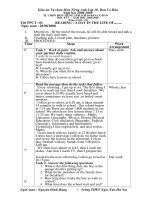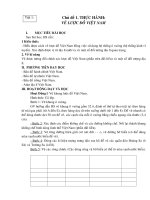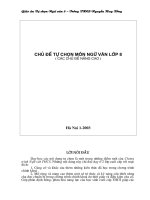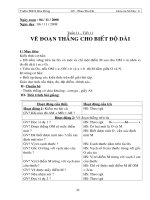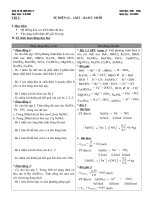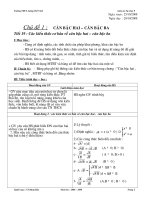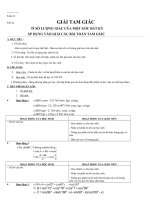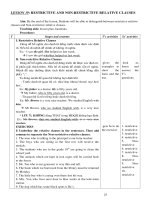giao an tu chon 10(CTC) HKII
Bạn đang xem bản rút gọn của tài liệu. Xem và tải ngay bản đầy đủ của tài liệu tại đây (221.33 KB, 21 trang )
English 10 (Optional lessons) Lê Ngọc Thạch
LESSON 19: CONDITIONAL SENTENCE (Type 1 & 2)
Aim: By the end of the lesson, Students will be able to know and use Conditional sentence: Type 1 & 2.
Teaching aids: lesson plan, handouts.
Procedure:
T Stages and contents T’s activities Ss’ activities
I. Conditional Sentences (If Sentences): Type 1
Ex: If I finish my homework, I will go to the concert
(= I will go to the concert if I finish my homework.)
* If clause: If I finish my homework,
* Main clause: I will go to the concert
1. Form
If + S + V1….., S + will + Vo……..
2. Use
Diễn tả một điều kiện có thể xảy ra ở hiện tại hoặc tương lai.
II. Conditional Sentences (If Sentences): Type 2
1. Form
If + S + V2/ed…..., S + would/could + Vo……
(be were)
2. Use
Diễn tả một điều kiện không thể xảy ra ở hiện tại.
Ex: - If he had much time, he would help you.
(He doesn’t have much time now)
- If I were in your position, I could do that.
(I am not in your position now)
EXERCISES
I/ Delete the incorrect verb form.
1. I’ll send/ send you some information if you’ll tell/ tell me your address.
2. If Kate will be/ is late again, she’ll lose/ loses her job.
3. You’ll be/ are sick if you’ll eat/ eat all that ice-cream.
4. There won’t be/ isn’t enough room if everyone will come/ comes.
5. If we’ll go/ go out tomorrow evening, we’ll miss/ miss that new program
on TV.
II/ Use conditional sentence type 2 with would or could.
1. We can’t bathe in this part of river because the water is too dirty.
2. We spend too much money on electricity because we have four air
conditioners in our house.
3. I can’t write to Linh because I don’t have her address.
4. Dick often causes accidents because he drives carelessly.
5. We can’t give much help to the poor because we waste a lot of money
on unnecessary things.
-gives the
examples to
explain the
form and the
use.
-gets Ss to do
the exercise.
-look at and
listen, answer
the T’s
questions.
1. send ;
‘ll tell
2. will be;
loses
3. are;
’ll eat
4. isn’t;
will come
5. ’ll go;
miss
Key:
1. If the water weren’t too dirty, we could bathe in this part of river.
2. If we didn’t have four air conditioners, we wouldn’t spend too much
money on electricity.
3. If I had Linh’s address, I could write to her.
4. If Dick didn’t drive carelessly, he wouldn’t often cause accidents.
-asks Ss to
rewrite.
-use
conditional
sentence: Type
2.
English 10 (Optional lessons) Leâ Ngoïc Thaïch
5. If we didn’t waste a lot of money on unnecessary things, we could give
much help to the poor.
-corrects -take notes.
LESSON 20: WRITING (A letter of invitations)
Aim: By the end of the lesson, Students will be able to write letters of Invitations.
Teaching aids: lesson plan, handouts, blackboard.
Procedure:
T Stages and contents T’s activities Ss’ activities
Task 1. Work in pairs. Write as many statements of invitation as you
know.
Ex: Do you feel like…?
-
-
-
-
-
Task 2. Match the three sections of an invitation letter with Tung’s
letter.
1. Reason for invitation
2. Statement of invitation (time, date, place)
3. Request for reply.
Hi Phi
A. Just call and tell me if you can come. Oh, one more thing, we early need you
to help to carry Nga- her motorbike was stolen last week. I’m expecting your
call.
B. Nga, Kim and I are planning a motorbike trip to Lai Thieu, and we’d very
much like you to join in.
C. We’ll start early, Sunday morning at 5:30, from my place. Breakfast will be
at Kim’s parents’ house when we arrive. After breakfast, we’re free to roam the
town and explore the various orchards there. Kim’s mother will treat us to a
special lunch that she prepares. After lunch we’ll decide whether to leave or
stay until 5:00 p.m.
Bye.
Tung
1:____________ 2:_____________ 3:______________
-asks Ss to
write the
invitations.
-gets Ss to read
the letter and
match with the
sections.
-pairwork.
1. B
2. C
3. A
Task 3. Work in groups. Nam wants to write a letter inviting his aunt,
who has just finished a course of Environmental Studies in Australia, to
come and talk about conservation at the weekly meeting of his school’s
club.
Now help him to write an invitation letter.
………………………………………………..………………………………..…………………………………………......
………………………………………………………………………………..………………….……..………………......
…………………………………………..………………………………………………………………………….……......
………………………………………………………………………………………………….….……………………......
……………………………………………..………………………………………………………..…………………......
……………………………………………….…………………………….……………………………….……………......
-asks Ss to
write the letter
of invitation.
-groupwork.
2
English 10 (Optional lessons) Leâ Ngoïc Thaïch
…………………………………………………..………………………………………………………………………......
……………………………………………………………………………………………………………..……………......
……………………………………………………………………………………………………………….……………......
…………………………………………………………………………………………………………..………..………......
Task 4. Exhibition. Stick some finished paper on the board.
-sticks some
letters on the
board.
-look at and
compare.
LESSON 21: WRITING (Write a Letter of Acceptance or Refusal)
Aim: By the end of the lesson, Students will be able to write s letter of acceptance or refusal.
Teaching aids: lesson plan, handouts, posters.
Procedure:
T Stages and contents T’s activities Ss’ activities
Task 1. Work in pairs. Put the following expressions in the right column.
A. Letter of Acceptance B. Letter of Refusal
1. It’s not possible for me to……
2. Your invitation to …… is a welcome.
3. I’m very sorry but I can’t make it/ come.
4. I’m quite unable to…..
5. I’d be very pleased/ happy to come.
6. Thank you for your…, but unfortunately…..
7. I’d be delighted to accept your invitation.
8. Your invitation to… was a lovely surprise.
9. I’m terribly sorry to have to refuse.
-Gets Ss to
work in pairs.
A: 2, 5, 7, 8
B: 1, 3, 4, 6, 9
3
English 10 (Optional lessons) Lê Ngọc Thạch
Task 2. Arrange the sentences (A-H) in the letter of Acceptance in the
logical order.
A. I’ll be very happy to come and stay with your family for a few days.
B. It’s nice to see your parents and you again.
C. Thanks very much for your invitation.
D. Your plans sound very exciting.
E. See you on this vacation.
F. I can’t wait to join you with all the fun we’ll have.
G. With love.
H. Dear Lan.
Task 3. Your friend, Tam, invites you to come to HCM City with his
parents in the coming vacation. You can’t accept his invitation and write a
letter of refusal to him.
………………………………………………………………………………………………………………..………………….
…………………………………………………………………………………………………………..……………………….
………………………………………………………………………………………………………….……………………….
……………………………………………………………………………………………………………..…………………….
………………………………………………………………………………………………………………….……………….
………………………………………………………………………………………………………..……………………….
……………………………………………………………………………………………….………………………………….
…………………………………………………………………………………………………….…………………………….
………………………………………………………………………………………………………………..………………….
…………………………………………………………………………………………………………..……………………….
…………………………………………………………………………………………………………………………………….
Task 4. Work in pairs. Swap each other’s letter to compare.
-asks Ss to read
and arrange.
-gets Ss to
write a letter of
Refusal.
-asks Ss to
compare.
1. H
2. C
3. A
4. B
5. D
6. F
7. E
8. G
-write 5 the
letter
individually.
-pairwork.
LESSON 22: PASSIVE VOICE
Aim: By the end of the lesson, Students will be able to review and change the sentences into the passive
voice. .
Teaching aids: lesson plan, handouts, paper.
Procedure:
T Stages and contents T’s activities Ss’ activities
1. Form:
Ex: (A) She arranges the books on the shelves every weekend.
S V O
(P) The books are arranged on the shelves (by her) every weekend.
S be V3/ed by O
Active: S + V + O + …….
Passive: S + be + V3/ed + (by O) + ……
2. Rules
Khi đổi từ chủ động sang bò động, ta chú ý các bước sau:
a. Xác đònh S (Chủ từ), V (Động từ), O (Túc từ) và thì của động từ trong
câu chủ động.
-gives the
example to
explain the
form.
-look at and
listen.
Ex: (A) She arranges the books on the shelves every weekend.
S V1 O
b. Đem O lên làm S, chuyển S xuống làm O đặt sau by.
Ex:(P)The books are arranged on the shelves (by her) every weekend.
4
English 10 (Optional lessons) Lê Ngọc Thạch
S by O
c. Thêm động từ to be (phù hợp với thì của động từ trong câu chủ động),
và chuyển động từ chính sang V3/ed.
Ex:(P)The books are arranged on the shelves (by her) every weekend.
be V3/ed
3. Notes:
a. Trong trường hợp có liên từ and và giới từ of, ta phải xác đònh đầy đủ
chủ từ hoặc túc từ khi chuyển đổi.
Ex:- Active: He and I see the film
Passive: The film is seen by him and me.
- Active: He bought a box of chocolates last week
Passive: A box of chocolates was bought last week.
b. Trong câu bò động: by O luôn đứng sau adverbs of place (trạng từ chỉ nơi
chốn) và trước adverbs of time (trạng từ chỉ thời gian).
Ex:(P)The books are arranged on the shelves (by her) every weekend.
adv of place by O adv of time
c. Trong câu bò động, ta có thể bỏ: by people, by us, by them, by
someone….
Ex: (P): A new bridge has been built across the river (by them).
EXERCISES
Put the verbs in parentheses into the correct active or passive voice
1. Last night my favorite program________________ (interrupt) by a special
news bulletin.
2. When I______________ (arrive) at the airport yesterday, I______________
(meet) by my cousin and a couple of friends.
3. Kim______________ (write) this composition last week. That one
_____________ (write) by Phi.
4. I don’t have my bicycle today. It’s with the repairman. It______________
(repair) right now.
5. Someone has bought the small lot behind my house and a new
house_______________ (build) on it next year.
6. A: Do you understand the explanation in the book?
B: No, I don’t. I_______________ (confuse).
7. A: When____________ your bike_______________ (steal)?
B: Two days ago.
8. A:__________ you_____________ (pay) your electricity yet?
B: No. I haven’t. but I’d better pay it today. If I don’t, my electricity supply
______________ (shut off) by the power company.
9. A: Did you hear about the accident?
B: No. What________________ (happen)?
A: A bicyclist_____________ (hit) by a taxi in front of the dorm.
B: ___________ the bicyclist______________ (injure)?
A: Yes. He_______________ (take) to City Hospital.
-helps Ss to
show the rules
to change.
-gets Ss to do
the exercise.
-take notes
when
necessary.
1. was
interrupted
2. arrived/ was
met
3. wrote/ was
written
4. is being
repaired
5. will be built
6. am confused
7. was…stolen
8. Have paid?/
will be shut off
9. happened/
was hit/ was…
injured/ was
taken
10. The Eiffel Tower_____________ (be) in Paris, France. It_____________
(visit) by millions of people every year. It_______________ (design) by
Alexandre Eiffel (1832-1923). It_______________ (erect) in 1889 for the
Paris exposition. Since that time, it_______________ (be) the most famous
landmark in Paris. Today it______________ (recognize) by people throughout
the world.
-has Ss give the
answers.
10. is/ is visited/
was designed/
was erected/
has been/ is
recognized
LESSON 23: CONDITIONAL SENTENCE (Type 2)
5
English 10 (Optional lessons) Lê Ngọc Thạch
Aim: By the end of the lesson, Students will be able to know and use Conditional sentence: Type 2.
Teaching aids: lesson plan, handouts.
Procedure:
T Stages and contents T’s activities Ss’ activities
Conditional Sentences (If Sentences): Type 2
1. Form
If + S + V2/ed…..., S + would/could + Vo……
(be were)
2. Use
Diễn tả một điều kiện không thể xảy ra ở hiện tại.
Ex: - If he had much time, he would help you.
(He doesn’t have much time now)
- If I were in your position, I could do that.
(I am not in your position now)
EXECISES
I. Choose the best answer to complete each sentence.
1) If I ……….……..….. you, I wouldn’t buy that coat.
A. am B. was C. wereD. would be
2) Tam ……………………. more if he ……………………… more time.
A. will read - had B. would read - has
C. read – had D. would read - had
3) If I didn’t want to go to the party, I ……….…….…………. go.
A. don’t B. didn’t C. won’t D. wouldn’t
4) I have to work tomorrow evening, so I can’t meet you.
A. If I have to work tomorrow evening, I can meet you.
B. If I didn’t have to work tomorrow evening, I would meet you.
C. I could meet you tomorrow evening if I don’t have to work. D. I
can meet you if I didn’t have to work tomorrow evening.
II. Choose the underlined part among A, B, C or D that needs
correcting.
1) If you sold your house, you didn’t get much money for it.
A B C D
2) What would you do if you have chance to travel in the submarine?
A B C D
-gives the
examples to
explain the
form and the
use.
-gets Ss to do
the exercise.
-gets Ss to do
the exercise.
-look at and
listen, answer
the T’s
questions.
1. C
2. D
3. D
4. B
1. B
2. B
III. Put the verbs in parentheses into the correct form.
1) I (take).......................... a walk if the weather were nice.
2) We would buy a house if we (have).................... enough money.
3) If I (be)...................... you, I (tell) …………………………… Brian the truth.
4) If I (be not) .................. tired, I would go to the movie with you.
5) If I (not have) ....................... class today, I would go shopping.
6) I don’t understand that sentence. If I (understand)…………………………… that
sentence, I (explain) …………………………………. it to you.
.
-gets Ss to do
the exercise.
1) took
2) had
3) were
4) were not
5) didn’t have
6) understood/
would explain
LESSON 24: CONDITIONAL SENTENCE (Type 3)
Aim: By the end of the lesson, Students will be able to review and use Conditional sentence: Type 3.
Teaching aids: lesson plan, handouts, paper.
Procedure:
T Stages and contents T’s activities Ss’ activities
6
English 10 (Optional lessons) Lê Ngọc Thạch
* Conditional Sentences (If Sentences): Type 3
1. Form
If + S + had + V3/ed….., S + would/could + have + V3/ed…..
2. Use
Diễn tả một điều kiện không thể xảy ra trong quá khứ.
Ex: If we had studied hard last year, we would have got good marks.
(We didn’t study hard last year and we didn’t get good marks)
* Notes
1. Unless: “If … not” có thể được thay bằng “UNLESS” (trừ phi):
Ex: - We will be late if we don’t hurry.
We will be late unless we hurry.
- If I have time, I’ll help you.
Unless I have time, I won’t help you.
2. Inversion: Bỏ IF trong 3 loại câu điều kiện (phải có đảo ngữ với
SHOULD/WERE/HAD):
Ex: - If it should be necessary, I will go.
Should it be necessary, I will go.
Ex: - If I were rich, I would buy a new car.
Were I rich, I would buy a new car.
Ex: - If you had asked me, I would have told you the answer.
Had you asked me, I would have told you the answer.
3. Một số từ/cụm từ có thể thay cho IF với nghóa tương đương: provided
that; so(as) long as (miễn là); in case (trong trường hợp); on condition that
(với điều kiện)
Ex: You can borrow my book provided that you bring it back.
-gives the
examples to
explain the
form and the
use.
-look at and
listen, answer
the T’s
questions.
EXERCISES
I/ Put the verbs in parentheses in the correct form to complete the
sentences or exchanges.
1. A: My mother always spends his money on expensive things.
B: If he ______________ (be) practical, he _______________ (can save)
some money.
2. A: Conservation programs have been introduced by most governments
to prevent reckless waste of land.
B: If there _______________ (not be) proper control by the
governments, the earth _____________ (be) greatly damaged now.
3. A: Last month, we paid a massive electricity bill.
B: If you ________________ (not waste) so much electricity, the bill
_____________ (not be) so large.
4. If Mr. Brown ________________ (save) some money when he was
young, he ______________ (not be) so poor now.
5. A: The invitation says six o’clock.
B: Well, it’s six thirty now.
A: If we _______________ (start) earlier, we ______________ (not be)
so late now.
II/ Rewrite the following sentences, using Conditional Sentence Type
3
1. He didn’t hurry, so he missed the train.
If __________________________________________________
2. My brother didn’t leave the car keys, so I couldn’t pick him up at the
station.
-gets Ss to do
the exercise.
-asks Ss to
rewrite.
1. were;
could save
2. weren’t;
would be
3. hadn’t
wasted;
wouldn’t have
been
4. had saved;
wouldn’t have
been
5. started;
wouldn’t be
-use
conditional
sentence; Type
3.
7
